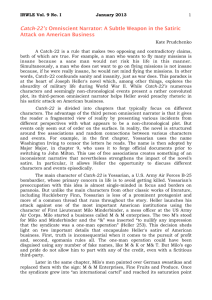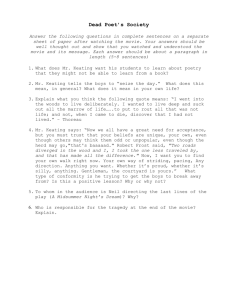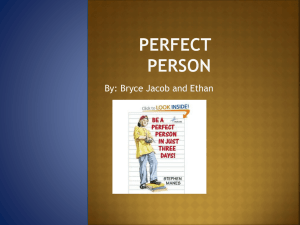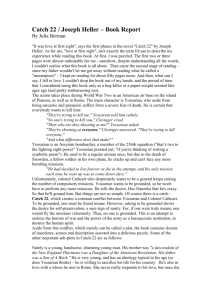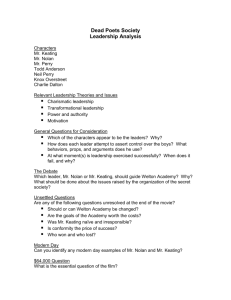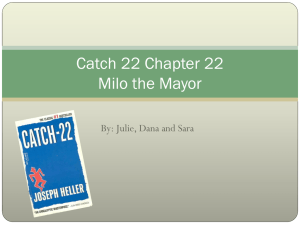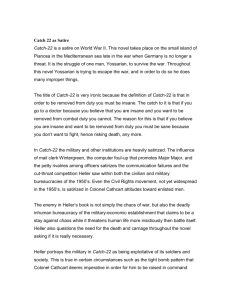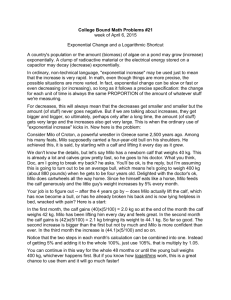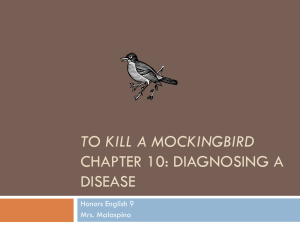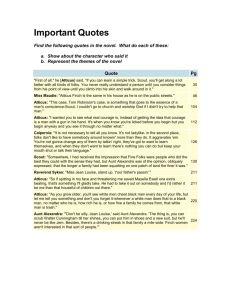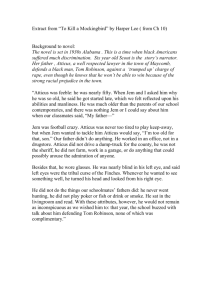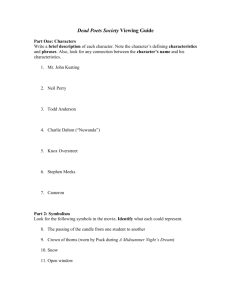Fall 2003
advertisement
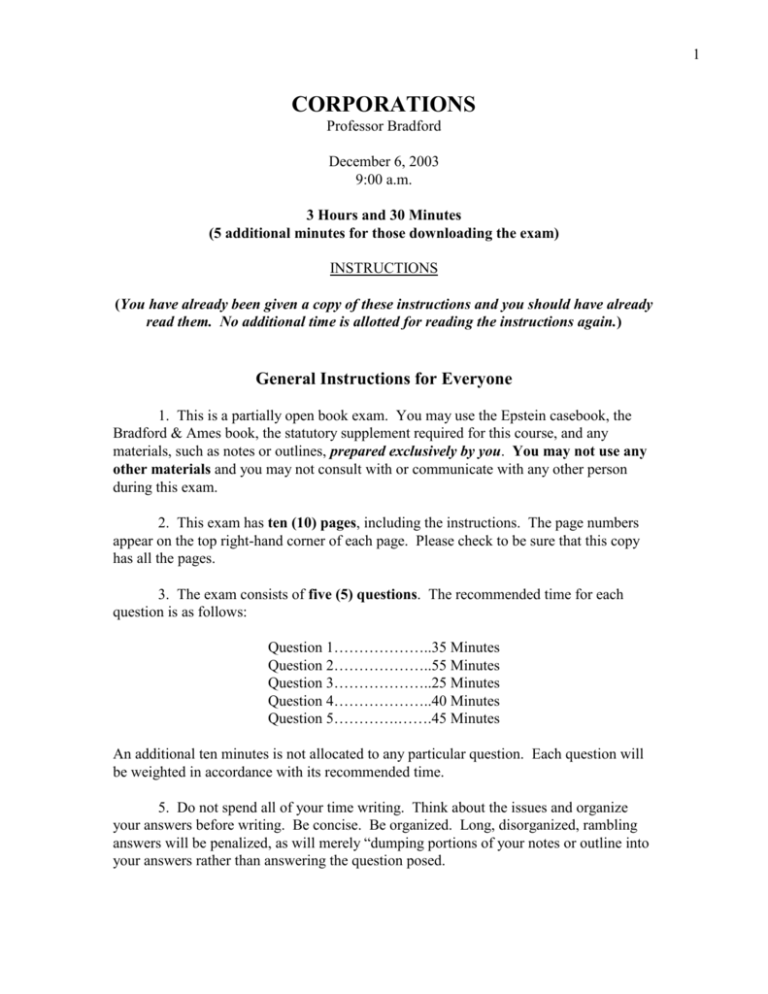
1 CORPORATIONS Professor Bradford December 6, 2003 9:00 a.m. 3 Hours and 30 Minutes (5 additional minutes for those downloading the exam) INSTRUCTIONS (You have already been given a copy of these instructions and you should have already read them. No additional time is allotted for reading the instructions again.) General Instructions for Everyone 1. This is a partially open book exam. You may use the Epstein casebook, the Bradford & Ames book, the statutory supplement required for this course, and any materials, such as notes or outlines, prepared exclusively by you. You may not use any other materials and you may not consult with or communicate with any other person during this exam. 2. This exam has ten (10) pages, including the instructions. The page numbers appear on the top right-hand corner of each page. Please check to be sure that this copy has all the pages. 3. The exam consists of five (5) questions. The recommended time for each question is as follows: Question 1………………..35 Minutes Question 2………………..55 Minutes Question 3………………..25 Minutes Question 4………………..40 Minutes Question 5………….…….45 Minutes An additional ten minutes is not allocated to any particular question. Each question will be weighted in accordance with its recommended time. 5. Do not spend all of your time writing. Think about the issues and organize your answers before writing. Be concise. Be organized. Long, disorganized, rambling answers will be penalized, as will merely “dumping portions of your notes or outline into your answers rather than answering the question posed. 2 6. For each question, assume, unless the question indicates otherwise, that the Revised Uniform Partnership Act, the Revised Uniform Limited Partnership Act, and the Revised Model Business Corporation Act apply. 7. If one of the statutes we have studied applies, cite the relevant sections and subsections and explain how those provisions apply to the facts of the problem. 8. If you believe that additional facts are needed to answer a question, state exactly what those facts are and how they would affect your answer. If you believe that a question is ambiguous or unclear, note the ambiguity or lack of clarity and indicate how it affects your answer. 9. The Honor Code is in effect. 10. Good luck and have a pleasant holiday. 3 Instructions for Those Taking the Exam at the Law College 1. If you are taking the exam at the Law College, you may take the exam in this room, in a typing room if you are typing, in the computer lab if you previously reserved a spot, or anywhere else at the Law College. 2. You have three hours and thirty minutes (3:30) to complete the exam. You must turn in your answers in this room, even if you are taking the exam somewhere else in the building. If you finish more than five minutes early, you may turn in your answers in the Dean’s Office. 3. If you are taking the exam on a computer, your answers must be formatted either for WordPerfect or Microsoft Word, and turned in on a disk. Your exam number must be on both the disk and the top of your answers. The file name should be your exam number. For example, if your exam number were 666, the file name would be 666.doc or 666.wpd. Double space. Do not put your name on the disk or anywhere on the answers. 4. Be sure to save a copy of your answers on your computer or on another disk, just in case it is needed. Do not delete it until the beginning of next semester. 5. If you are typing the exam, your exam number should appear on the top of each page of typing paper. Double space. Do not put your name anywhere on the answers. 6. If you have any technical problems during the exam, please report them immediately to the Dean’s Office; we will assume you had no technical problems until when you reported them. Be prepared to finish your exam by writing it. (Regular notebook paper is O.K.) 7. Save your answers often. No allowances will be made for problems you could have avoided by saving your answers regularly. 4 Instructions for Those Downloading the Exam 1. If you are downloading the exam, you may take the exam anywhere you wish. The exam is available at the following URL at exactly 9:00 a.m. on December 6: www.unl.edu/bradford/Final Exam.htm. That page also has a link to the official exam clock. Please use that time to determine when you must return your exam answers. 2. You have three hours and thirty-five minutes (3:35), until 12:25 p.m. to complete and return the exam. This includes additional time to download and print the exam. You must send an e-mail, with the exam attached, to the Dean’s Office by no later than 12:35 p.m. official exam time. E-mail the exam to the following address: vlill2@unl.edu. Put “Corporations Exam” and your exam number on the subject line. For example, if your exam number is 666, the subject line would read, “Corporations Exam—Exam No. 666.” Vicki Lill will notify you by e-mail when your file is received. 3. Your answers must be formatted either for WordPerfect or Microsoft Word. Your exam number should be on the top of your answers. The file name should be your exam number. For example, if your exam number is 666, the file name would be 666.doc or 666.wpd. Do not put your name anywhere on the answers. 4. Be sure to save a copy of your answers on your computer or on a disk, just in case it is needed. Do not delete it until the beginning of next semester. 5. If you have any technical problems during the exam, please contact Glenda Pierce at 472-8264 or Vicki Lill at 472-8262 immediately. We will assume you had no technical problems until you reported them. Be prepared to finish your exam by writing it. (Regular notebook paper is O.K.) 6. Save your answers often. No allowances will be made for problems you could have avoided by saving your answers regularly. 5 Question One (35 Minutes) Imperial Galactic Limited is a limited partnership organized under the Revised Uniform Partnership Act (not the 2001 Act). Imperial Galactic operates a hotel. Its sole general partner is Vogon LLC, a manager-managed limited liability company. Vogon’s only business is serving as the general partner of Imperial Galactic. Arthur Dent is the managing member of Vogon; Arthur is also a limited partner, but not an employee, of Imperial Galactic. Vogon’s operating agreement authorizes its manager to take any action necessary to carry out Vogon’s business. Ford Prefect owns a towel company. On September 1, 2003, Ford visited Imperial Galactic’s office and asked to speak to the person in charge. “I’m in charge. I run the hotel,” Arthur told Ford. After a long discussion, Arthur signed a contract agreeing to buy 4,200 towels from Ford for a cash price of $10,000. Arthur signed the contract as follows: “Imperial Galactic Limited Partnership By Arthur Dent.” Imperial Galactic’s partnership agreement gives unlimited managerial authority to its general partner, Vogon. The Imperial Galactic partnership agreement also authorizes its four limited partners, all employees of Vogon, to enter into contracts on behalf of Imperial Galactic. Discuss whether Arthur Dent is personally liable on the contract with Ford Prefect. 6 Question Two (55 Minutes) John Yossarian (“Yossarian”) is a director of Milo Enterprises, Inc. (“Milo”), a corporation incorporated in Delaware. Milo is in the business of manufacturing computer guidance systems for airplanes and helicopters. Milo is not a publicly traded company; it has only 300 shareholders. Until recently, Yossarian owned 10,000 shares of Milo stock. He bought 7,000 of those shares three years ago, for $30 a share, when he was first elected to Milo’s board. He bought another 3,000 shares four months ago, for $48 a share, when Milo was having a temporary cash flow problem and needed some cash. For the past two months, Yossarian has been negotiating to sell some of his stock back to Milo to help pay for his daughter’s law school education. Yossarian is also the managing partner of Heller Research Partnership (“Heller”), a general partnership that develops optical and laser devices. The other two partners are Nately and Clevinger. In November, Yossarian attended a presentation by Heller researchers, who demonstrated a new laser guidance system that would work with optical photon technology rather than existing computers. The new system will be cheaper and more effective than existing guidance systems. Nately and Clevinger were also at the research presentation. “Don’t you own stock in a company that makes computer guidance systems?,” Clevinger asked Yossarian. “This will kill them. Too bad you can’t sell the stock now that you know this top secret information.” “Yes, I own Milo stock,” Yossarian replied, “but not for long. I’m selling it as soon as possible.” In response, Nately and Clevinger just looked at each other and said nothing. The next day, Yossarian met with Orr, the president of Milo, and told him he would like to get the stock sale completed. The negotiations concluded two weeks ago, with Yossarian selling 2,200 shares back to Milo for $50 a share. A majority of the Milo board, none of whom have ties to Yossarian, approved the repurchase. Two days ago, Heller announced that it had developed the new optical guidance system. Discuss the possible claims against Yossarian arising out of his sale of the 2,200 shares to Milo. 7 Question Three (25 Minutes) Santiago is a director of Hemingway Corporation (“Hemingway”), a public corporation in the business of selling frozen fish to grocery stores across the United States. Hemingway is incorporated in a state that has adopted the latest version of the Model Business Corporation Act. Santiago owns a sole proprietorship, Marlin Fishing (“Marlin”), a commercial fishing operation in California. Marlin does not sell any fish to Hemingway. On October 31, while on a trip seeking new business for Hemingway, Santiago met DiMaggio, the multimillionaire owner of the DiMaggio Corporation. DiMaggio told Santiago that DiMaggio Corporation was opening a new chain of grocery stores in California, and was looking for suppliers. Santiago told DiMaggio about Marlin and, shortly afterward, Marlin signed a contract to be the exclusive supplier of fish to DiMaggio’s grocery stores. Hemingway has filed a lawsuit against Santiago claiming that he breached his fiduciary duty to Hemingway by allowing Marlin to take this opportunity. Explain why section 8.61 of the RMBCA does not apply to Hemingway’s claim against Santiago. (Do not discuss any other issues!) 8 Question Four (40 Minutes) Rand Corporation, a construction company, is incorporated in Delaware. It currently has five directors on its board: (1) Peter Keating; (2) Austin Heller; (3) Dominique Francon; (4) Steven Mallory; and (5) Ellsworth Toohey. Keating owns 60% of the stock of another corporation, Cameron Corporation. He is not a director, officer, or employee of Cameron. On July 1, 2003, the board of Rand approved a contract to buy 10,000 tons of Grade A bricks from Cameron for a price of $150,000. Keating was not involved in negotiating the contract, but he did vote in favor of it. On November 1, 2003, Howard Roark filed a shareholder’s derivative action on behalf of Rand alleging that Keating, Heller, and Francon breached their fiduciary duties in approving the Cameron contract. The complaint includes the following allegations: General Allegations 11. At the time of the contract with Cameron, Rand’s board of directors consisted of three directors: defendants Peter Keating, Austin Heller, and Dominique Francon. All three directors voted in favor of the contract. The other two board positions were vacant at the time, but were subsequently filled by Steven Mallory and Ellsworth Toohey, who are not defendants in this action. 12. The plaintiff did not make a demand on the board of director prior to instituting this action. Demand is excused because of the facts alleged in Counts One and Two. Count One: Violation of the Duty of Care 13. The Rand directors violated their duty of care in approving the transaction. 14. The price paid in the transaction constitutes corporate waste. The plaintiff has identified ten comparable purchases of standard Grade A brick in 2003. Of those, nine were for prices lower than the price paid by Roark to Cameron. The tenth was for a slightly higher price per ton, but that contract required the supplier to deliver the bricks over a longer distance. 15. The Rand directors failed to adequately inform themselves prior to 9 approving the Cameron contract. The entire meeting lasted only one hour, and the agenda for that meeting also included other matters. Count Two: Violation of the Duty of Loyalty 16. The Rand directors violated their duty of loyalty in approving the transaction. The transaction constituted impermissible self-dealing and was unfair to the corporation. 17. Keating owns 60% of the stock of Cameron Corporation, the seller of the brick. The board approved the transaction even though all the directors were aware of this conflict of interest. For the reasons specified in ¶ 14, the price paid was unfair to Rand. 18. Heller and Francon had no direct personal interest in the transaction, but they are subject to Keating’s control and direction. Francon is a close personal friend and golfing buddy of Keating. They have known each other since they were children, and were once engaged. Heller was chosen for the Rand board by Keating and almost always votes the same way Keating votes. As the complaint points out, Mallory and Toohey are outside directors who were elected to the board after the board approved the Cameron contract. Neither Mallory nor Toohey have any connection to the transaction and both are independent of Keating. Rand has filed a motion asking the court to dismiss the action because Roark did not make a demand on the board of directors prior to instituting the action. Discuss whether the Delaware court will grant the motion to dismiss. 10 Question Five (45 Minutes) In 1980, Atticus Finch (“Atticus”) opened a sporting goods store in Maycomb County, Alabama, “Finch’s Guns.” Atticus did not file anything to create this business. The business was very successful and eventually became more than Atticus could handle. Last year, Atticus asked his friends Scout and Jem to come work with him. He told them that, if they would work full-time for him and pay him $2,500 each so he could expand the store, he would pay them $20 an hour and give them each 1/8 of the store’s profits. Scout and Jem agreed. There was no written agreement and they have had no further discussions about how the store should operate. Atticus continues to do all the management work for the store—bookkeeping, ordering, and all the paperwork. Scout and Jem work in the store as sales people. One day, Scout was talking in the store to Walter Cunningham, a salesman for Ewell Firearms. Atticus walked by and said, “Walter, don’t try to convince Scout to buy anything from you. I’m the only one who can order things for my store.” After Atticus walked away, Scout just smiled at Walter and said, “Never mind him, Walter. We would love to buy some guns from you.” Walter handed Scout a form contract to purchase 10 high-powered rifles for a total of $3,000. Scout signed it simply “Scout” and handed it back to Walter. Discuss whether Atticus is personally liable to Ewell on this contract.
